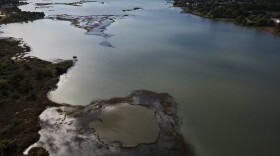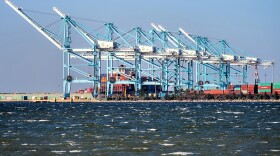This story was reported by West Virginia Public Broadcasting.
Some Virginia landowners have reported problems with erosion control along the route of the Mountain Valley Pipeline, and they’re looking to West Virginia for a solution.
On May 15, heavy rainfall washed out a section of slope that had been restored on the MVP’s path through Brush Mountain in Montgomery County.
There have been similar problems before: Virginia’s Department of Environmental Quality has issued fines to MVP for its failure to control erosion on the project.
The pipeline is awaiting approval from the Federal Energy Regulatory Commission to go into service transporting natural gas from West Virginia into Virginia.
Lynda Majors, of Blacksburg, who chairs a group called Preserve Montgomery County, wrote to the Virginia DEQ and FERC.
Majors’ group asked state regulators to use a West Virginia restoration plan locally, because she said it better protects slopes from the kind of erosion that occurred at Brush Mountain.
“This project was proposed 10 years ago. They’re using restoration stuff that’s appropriate for a highway, which never goes back to the original contours of the land. It’s kind of level and straight,” she said. “So, that stuff probably works great for restoring a highway, but it does not work on steep slopes. You have to get the water off the right of way. You cannot keep the water on there and keep the soil, too.”
Irina Calos, a DEQ spokesperson, said MVP went back to the area the day after the May storm and removed sediment, reseeded and re-mulched what was washed away, and installed temporary stormwater controls that will remain until vegetation is established.
“The area of concern received a substantial amount of rain within just a couple of hours. This occurred very soon after post-construction regrading and stabilization, so the water was discharged onto areas not fully stabilized,” Calos said. “Other areas with similar characteristics that had already been stabilized did not experience issues following heavy rains.”
Natalie Cox — a spokesperson for Equitrans Midstream, MVP’s builder — said the restoration plan meets the requirements set by state law and FERC.
“MVP’s plan in Virginia includes the establishment of a permanent, protective layer of perennial vegetation, combined with permanent post-construction stormwater management features that will prevent erosion and protect adjacent resources,” Cox said. “Inspections of the project area will continue until the VADEQ determines that Mountain Valley has met the requirements of its state authorizations.”
Majors said a better stormwater management plan exists: The one used in West Virginia. It removes water at closer intervals instead of allowing the erosion of hundreds of feet of topsoil.
“You have to get water off every 50 to 100 feet, otherwise, you have a disaster,” she said. “You know, at least if you get it off the right of way, you’re into leaf litter, tree roots, bushes, things like that. And it’s not just a giant torrent of water that’s been gaining speed down the slope for 600 feet.”
Pipeline opponents have been concerned during the six years of construction about its impact on water quality and critical habitats. The 303-mile project crosses hundreds of rivers and streams that supply drinking water to communities, and serve as habitats for endangered species.
On May 1, a section of the pipe burst at Bent Mountain in Roanoke County during a water-pressure test. The event released water and sediment into adjacent properties.
State lawmakers and county commissions have asked FERC to deny the pipeline’s in-service request until all safety concerns are resolved and all easements are restored.











